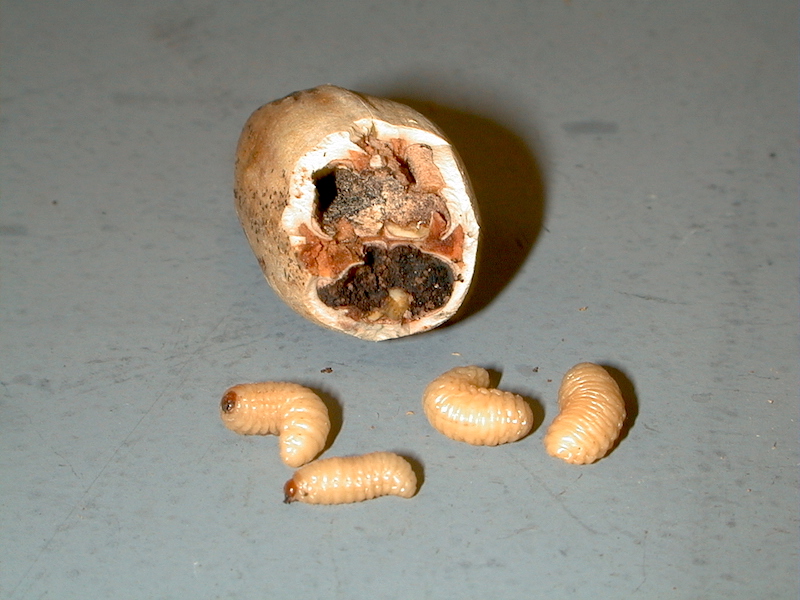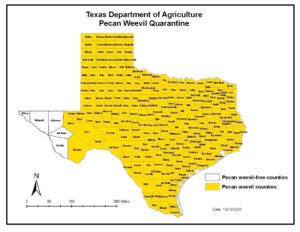Hear No Weevil, See No Weevil

Pecan weevil larvae devour a harvestable pecan. (Photo by Bill Ree)
Under Commissioner Sid Miller, the Texas Department of Agriculture (TDA) has worked with producers in both the quarantined and non-quarantined areas to develop protocols allowing the shipment of inshell pecans from quarantined areas to shellers in the El Paso region while keeping our producers in the weevil-free areas of Texas safe from infestation.
The pecan weevil, a dangerous nut pest of pecans, is found throughout the southern United States and is native to many portions of Texas. The adult is a brownish weevil, about 3/8 inch long. In the summer, adult weevils puncture and feed on immature nuts, causing them to abort. Later in the growing season, female weevils lay their eggs into larger, more mature pecans. Pecan weevil larvae hatch from those eggs in the shell of the pecan. The larvae are cream-colored grubs with reddish heads that consume the pecan’s developing kernel from the inside out, rendering it unfit for human consumption. Pecan weevil infestations can reduce nut yield by up to two points within a growing season.
In conjunction with the Texas Pecan Board, TDA has partnered with Dr. Charles Suh, a research entomologist with USDA, to develop a Pecan Weevil Pheromone Project. This project first began in the summer of 2020, continued into the summers of 2021 and 2022, and is set for 2023. The Pecan Weevil Pheromone Project’s goal is to determine if pecan weevils admit a pheromone similar to the boll weevil in order to replicate the pheromone for trapping purposes. If this is accomplished, we will be able to develop a trapping protocol, potentially leading to certification programs for producers within the quarantined area as well as the possible release of counties from quarantine. This project is important for both producers in the pecan weevil quarantine area and producers in the weevil-free areas of Texas. The project has stirred up a lot of excitement among pecan-producing states. In fact, in 2022, the New Mexico Department of Agriculture asked to assist with funding and gave the Texas Pecan Board $30,000 to continue its research.
TDA and the Texas Pecan Board are confident the pheromone project will be a net positive for all producers in Texas. Until we see the fruits of our labor, producers are still required to abide by the current pecan weevil quarantine regulations. What is the current quarantine?
In accordance with Texas Administrative Code, Title 4, Part 1, Chapter 19, Subchapter L, quarantined articles from quarantined areas are prohibited entry into or through the free areas of Texas unless they have been treated to eliminate pecan weevil using a TDA-approved treatment method. Quarantined articles include every part of all hickory, pecan, and walnut trees, except the extracted nut meats, and originate from the quarantined area. Inshell pecans are quarantined articles.
Currently, all areas in the State of Texas, except El Paso, Hudspeth, Culberson, Jeff Davis, and Presidio counties, are considered quarantined for pecan weevil. Any violations of these regulations can lead to fines and penalties, as well as any license with TDA being revoked.
So, how can a producer ship inshell pecans to a weevil-free area? Producers can ship inshell pecans to weevil-free areas by using a treatment method approved by TDA to eliminate pecan weevils.
The following are TDA-approved treatment methods for inshell pecans.
1) Cold treatment of inshell pecan nuts held at a temperature of 0 degrees Fahrenheit (F) for a period of 7 consecutive days or 12.2 degrees F for a period of 14 consecutive days or longer after the entire lot has reached the desired temperature.
2) Hot water bath treatment of inshell pecan nuts. Water shall be maintained at or above 140 degrees F for a minimum of 5 continuous minutes or 170.6 degrees F for a minimum of 3 continuous minutes. Water must be continually agitated throughout the dipping period. Inshell pecan nuts must be completely immersed. The exposure period shall begin when the water has regained the desired temperature following the introduction of inshell pecan nuts.
Please note that fumigation is currently not a TDA-approved treatment method. Fumigation has been proven ineffective at 100% elimination of pecan weevil larvae in nuts without exit holes.
One issue we uncovered from multiple conversations with producers within the quarantined areas was the lack of treatment facilities (or cold storage facilities) that reach desired temperatures necessary to fully treat inshell pecans. From these conversations and listening to the concerns of growers in the weevil-free areas of Texas, TDA was able to develop another method to ensure regulations are followed but also provide relief to those producers with inshell pecan shipments from quarantine areas.
In 2019 TDA created and implemented an In-Shell Pecan Compliance Agreement, which allows inshell pecans from quarantined areas to be shipped straight to El Paso for cold treatment. Upon implementing the compliance agreement, producers within the quarantine area reported an immediate combined savings of roughly $500,000 in shipping costs. This compliance agreement provides a regulated pathway for untreated shipments to enter weevil-free areas for treatment.
If you would like to ship or receive inshell pecans in the El Paso region from quarantined areas for treatment, you must obtain a TDA compliance agreement. To set up a compliance agreement with the department, please contact TDA by email at PlantQuality@TexasAgriculture.gov. If you would like to see more about the current regulations concerning the pecan weevil, the pecan weevil quarantine, and learn about the TDA-approved treatment facilities, please visit: https://www.texasagriculture.gov/Regulatory-Programs/Plant-Quality/Pest-and-Disease-Alerts/Pecan-Weevil.
TDA will continue working with pecan producers to ensure the entire pecan industry in Texas remains a leader in the United States.


